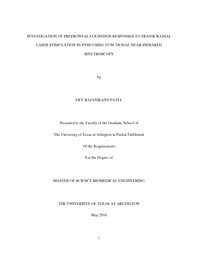
ATTENTION: The works hosted here are being migrated to a new repository that will consolidate resources, improve discoverability, and better show UTA's research impact on the global community. We will update authors as the migration progresses. Please see MavMatrix for more information.
Show simple item record
| dc.contributor.advisor | Liu, Hanli | |
| dc.creator | Patel, Dev Rajanikant | |
| dc.date.accessioned | 2016-09-28T18:54:32Z | |
| dc.date.available | 2016-09-28T18:54:32Z | |
| dc.date.created | 2016-05 | |
| dc.date.issued | 2016-05-31 | |
| dc.date.submitted | May 2016 | |
| dc.identifier.uri | http://hdl.handle.net/10106/25933 | |
| dc.description.abstract | In recent years low level laser therapy (LLLT) has been of great research interest because of its therapeutic applications in psychiatry, neurology and ophthalmology. In-vivo transcranial delivery of LLLT has shown to induce beneficial metabolic effects and increase in cognitive functions and hence has been found to be useful in treating neurodegenerative disorders. The aim of this study was to evaluate effects of LLLT on prefrontal cognitive functions, namely attention and short term memory, over six sessions on veterans with Post-Traumatic Stress Disorder (PTSD), using near infrared spectroscopy (fNIRS). In this study the subjects were instructed to perform two neurocognitive tasks, namely Psychomotor Vigilance Task (PVT) and Delayed Match-to-Sample task (DMS). Sustained attention of each individual was evaluated by PVT and DMS was used to evaluate short-term memory. fNIRS was used to measure to hemodynamic responses occurring while performing the tasks. We first measured the behavioral and hemodynamic responses of healthy control subjects while performing the two tasks without administering laser stimulation. Each veteran with PTSD was given six treatment session. In each session they were instructed to perform the two tasks before and after LLLT.
We evaluated the effect of LLLT on veterans over six treatment sessions. We also evaluated the pre and post treatment effects over six sessions. We then compared the results of controls with that of the veterans before they underwent the first treatment session i.e. pre-LLLT 1, in order to see if there is any difference between their performances. We also compared the results of controls with that of veterans after receiving the last treatment i.e. post-LLLT 6, in order to see if veterans had an improved cognitive function after receiving all six treatments.
The results indicated that LLLT had a beneficial effect on PTSD subjects for the DMS task. However, LLLT did not show any significant effect on the PTSD subjects for the PVT task. | |
| dc.format.mimetype | application/pdf | |
| dc.language.iso | en_US | |
| dc.subject | fNIRS | |
| dc.subject | PTSD | |
| dc.subject | LLLT | |
| dc.subject | PVT | |
| dc.subject | DMS | |
| dc.title | INVESTIGATION OF PREFRONTAL COGNITION RESPONSES TO TRANSCRANIAL LASER STIMULATION IN PTSD USING FUNCTIONAL NEAR INFRARED SPECTROSCOPY | |
| dc.type | Thesis | |
| dc.degree.department | Bioengineering | |
| dc.degree.name | Master of Science in Biomedical Engineering | |
| dc.date.updated | 2016-09-28T18:56:39Z | |
| thesis.degree.department | Bioengineering | |
| thesis.degree.grantor | The University of Texas at Arlington | |
| thesis.degree.level | Masters | |
| thesis.degree.name | Master of Science in Biomedical Engineering | |
| dc.type.material | text | |
| dc.creator.orcid | 0000-0002-1839-0938 | |
Files in this item
- Name:
- PATEL-THESIS-2016.pdf
- Size:
- 1.861Mb
- Format:
- PDF
This item appears in the following Collection(s)
Show simple item record


